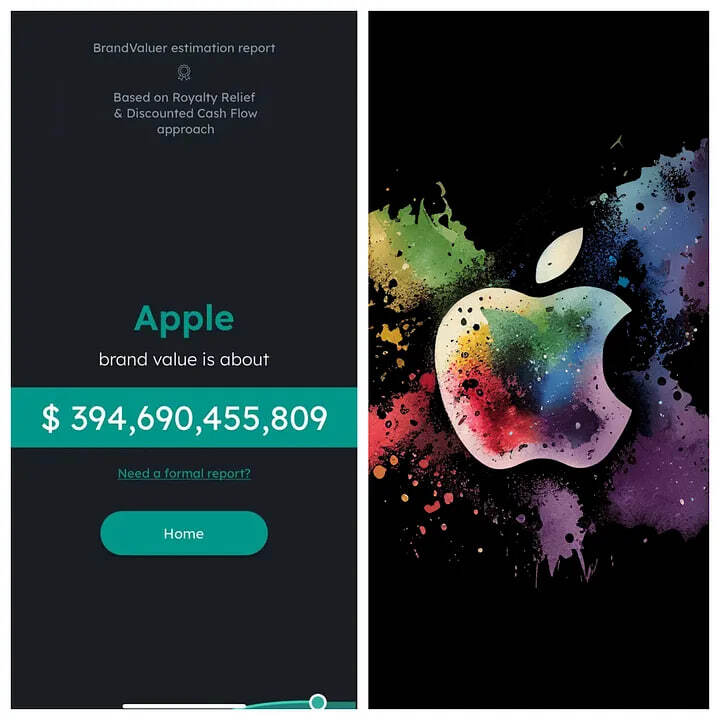
A brand’s name can make or break its success. Some companies choose names that directly reflect what they do, while others opt for something more abstract. Here’s a look at how eight of the most iconic brands came up with their names—and the surprising meanings behind them.
Apple
Apple’s name has nothing to do with computers, but rather, a simple and effective marketing strategy. Steve Jobs, co-founder of Apple, chose the name in 1976 because he wanted something friendly and non-intimidating. He was also inspired by his time working in an apple orchard and believed the word “Apple” sounded fun, fresh, and simple—qualities he wanted the brand to reflect. The name also helped Apple appear ahead of its competitor, Atari, in the phone book. Apple had a pretty good year in 2023, making a $383 billion revenue with a net income of nearly $97 billion! According to the Brand Valuer app, Apple’s estimated brand worth is at a nice $394 billion!

Airbnb
Airbnb, the now-global vacation rental platform, started in 2008 when its founders, Brian Chesky and Joe Gebbia, rented out air mattresses in their apartment to make extra cash. They initially called their service "Air Bed & Breakfast," but later shortened it to Airbnb to create a more modern and brandable name. In 2023, Airbnb pulled in $9.91 billion in revenue. According to the BrandValuer app, Airbnb’s brand is worth an estimated $5.4 billion.

Google’s name is a play on the word "Googol," a mathematical term for the number 1 followed by 100 zeros. Founders Larry Page and Sergey Brin wanted a name that represented the vast amount of information their search engine could organize. The name "Google" was actually a typo when registering the domain—but it stuck, and today, it’s synonymous with internet searches. In the 2023 fiscal year making a $305 billion with the 4th quarter being great bringing in over $85 billion in revenue, which is $10 billion more than it made in the 2022 4th quarter! Now, according to the Brand Valuer app, Google is estimated brand worth is at a cool $311 billion!

LEGO
The famous toy brand LEGO gets its name from the Danish phrase "Leg Godt," which translates to "play well." Founded in 1932 in Denmark, the company originally made wooden toys before moving to plastic bricks. Ironically, “Lego” also means “I put together” in Latin, though this was purely coincidental. With revenues of $9.65 billion annually, it is a giant in the toy industry. According to the BrandValuer app, Lego’s brand worth is an estimated $5.5 billion.

Spotify
Spotify's name came about during a brainstorming session between founders Daniel Ek and Martin Lorentzon. While shouting out potential names, one of them misheard a suggestion as “Spotify.” They liked the sound of it and later justified the name by combining "spot" (as in finding something) and "identify" (as in recognizing music). In 2023, Spotify was able to hang on big posting a $14.33 billion revenue and according to the BrandValuer app, the streaming service’s brand is worth an estimated $13.8 billion

Amazon
Jeff Bezos originally considered calling his company “Cadabra” (short for "Abracadabra"), but he quickly realized it sounded too much like "cadaver" over the phone. Instead, he chose “Amazon” because it evoked a sense of vastness—just like the world's largest river. The name also helped it rank at the top in alphabetical listings. In 2023 the company pulled in $574 billion, an 11% increase from their 2022 revenue. According to the BrandValuer app, Amazon’s brand is worth an estimated $348 billion.

Red Bull
Red Bull’s name is a direct translation of the Thai energy drink that inspired it: “Krating Daeng,” which means "red bull" in Thai. Austrian entrepreneur Dietrich Mateschitz discovered the drink in Thailand, reformulated it for Western tastes, and launched it internationally under the now-famous Red Bull brand. In 2023, Red Bull pulled in $11.3 billion in revenue. According to the BrandValuer app, Red Bull’s brand is worth an estimated $6.7 billion.

Microsoft
Bill Gates and Paul Allen founded Microsoft in 1975, combining the words "microcomputer" and "software" to create a name that described their business. Initially written as "Micro-Soft," the hyphen was later dropped, making it one of the most recognizable tech brands today. In 2023, Microsoft brought in $211.93 billion in revenue. According to the BrandValuer app, Microsoft’s brand is worth an estimated $204 billion.

Conclusion
A brand name doesn’t have to describe the product directly—it just has to be memorable. Whether inspired by personal experiences, mathematical concepts, or simple wordplay, these brands show that a great name can define a company's identity and contribute to its long-term success.
Would you change the name of any of these brands if you had the chance? Let me know your thoughts!




